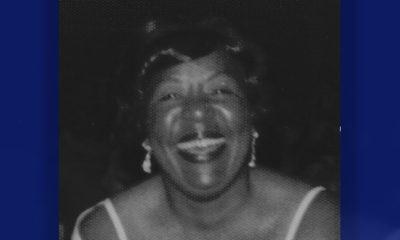Black History
OP-ED: African Landing Day and the 400th Landing Commemoration
CHICAGO CRUSADER — On August 25, 1619, the first ship carrying enslaved Africans to the Colonial Colonies of English North America landed at Point Comfort.
On August 25, 1619, the first ship carrying enslaved Africans to the Colonial Colonies of English North America landed at Point Comfort (today’s Fort Monroe) in Hampton, Virginia. From that perilous landing, their presence has had a profound impact on the cultural manifest of America’s past and still impacts the social, economic and political disparities facing families of color today. In 2019 our nation and other countries around the world will collectively come together to commemorate the 400th Anniversary of this dreadful but historic event.
The first Africans did not arrive at Ellis Island, Plymouth Rock, or Jamestown, but arrived as captured human cargo on the high seas during the transatlantic slave trade. In August 1619, the English privateer ship the White Lion, landed at Point Comfort carrying the first 20 and odd Africans who had been captured from the slave ship San Juan Bautista in a fierce battle in the Bay of Campeche in the Gulf of Mexico. In consort with the White Lion was another English privateer ship, the Treasurer, who also took enslaved Africans. This was the first time a privateer or pirate ship had unknowingly mistaken a Spanish galleon ship for a slave ship whose primary cargo was human Africans. The first enslaved Africans who were brought to Point Comfort were not immigrants, but their landing was one of the most significant events in our country’s history. The first generations of Africans brought to Virginia were captured from the villages of Ndongo, Kongo and Kabasa in the Angola region of Africa. Those first enslaved Africans were skilled farmers, herders, blacksmiths and artisans. They had the perfect skill set needed for the colonies to survive. Along with their culture, they also brought many ideas and innovations including floodways, crop cultivation, music and dance. It was their unbridled spirit and labor that helped build Hampton, Fort Monroe, America, and the White House, but they toiled through many generations of unpaid bond- age servitude, civil unrest, and the march for civil rights, before their descendants became legal citizens.
Those first twenty and odd enslaved Africans who arrived at Point Comfort marked the beginning of 246 years of unpaid servitude. For the first two generations from 1619 until 1661 some of the enslaved Africans were granted their freedom and in some cases were able to purchase the freedom of their relatives, start their own homesteads, and employ indentured servants. Yet others were held in bondage for life or until 1661 when Virginia established a law legalizing lifelong servitude of all un-free Africans.
Since 1994, Calvin Pearson, Founder, and members of Project 1619 Inc. have been the catalyst to change the narrative of the landing of the first Africans at Point Comfort in Colonial North America. In 2008, they created African Landing Day in the City of Hampton to commemorate the landing of the first Africans in Virginia at Point Comfort. They have been the champions for exposing and promoting the true history of our ancestors. Slavery is an indelible stain on America’s soul. Slavery is the biggest human transgression perpetrated by one human being on another. And through it all their descendents have endured with dignity the cruelest barbaric acts of enslavement. They have endured through the Jim Crow era, segregation, and the disparity of basic human rights. The chains of slavery have now become the unfair prison sentences for minor crimes where other ethnic groups receive less or no prison time. The chains of slavery have now become racial profiling where you can get stopped merely because the color of your skin or arrested for a crime you did not commit. The chains of slavery are now the disparity of young brown and black people not being able to get a quality education or a job because of the socioeconomic, financial conditions of their living environment. Our people are being moved out of urban communities because of gentrification and may never return. Our young girls are being captured and forced into human trafficking and the sex slave industry. Our young people are hooked on crack; heroin and opioids as a way to deal with the deck of cards they have been dealt. When will it all end?

The Above Sign was installed by the Virginia Department of Historic Resources at the Landing Site at Fort Monroe.
Two of the original Africans who arrived on the White Lion in 1619 at Point Comfort were Antony and Isabella. In January 1625, according to the Virginia census, those two Africans, Isabella, Antonio and their son William were living in present day Hampton in Capt. William Tucker’s home, who was the commander at Point Comfort (today’s Fort Monroe). Their son William is the first documented African child born in English North America. He was baptized on January 4, 1624.
Capturing over 30 million Africans from West and East Africa, and killing millions more in battle, removed child bearing young women and African boys and men, that changed the dynamics of the African family forever.
Project 1619 invites you to come to Hampton, Virginia on August 23-25, 2019 to be a witness to the 400th Anniversary Commemoration. Walk on the hallowed grounds of your ancestors. Present day Fort Monroe in Hampton is ground zero for the landing of the first enslaved Africans. This is where the story of Africans in America began. On that fateful day on Tuesday August 25, 1619 two Africans, Isabella and Antony, captured from Angola, stepped off an English privateer on the land at Point Comfort to start a legacy and a 400 year odyssey to create a new home for generations of future descendants. Come to Hampton and be a part of history. For more information go to www.project1619.org.
Calvin Pearson, Project 1619 Founder said “Transatlantic slave trade, just like the systematic elimination of the Native American Indian in the United States, and the Holocaust in Germany, are human tragedies that changed the world. We can not change history or the impact that it had on past generations. But we should always recognize and learn from the perils and transgressions of mankind’s inhumanity against one another.
This article originally appeared in the Chicago Crusader.
Activism
Oakland Post: Week of December 10 – 16, 2025
The printed Weekly Edition of the Oakland Post: Week of – December 10 – 16, 2025

To enlarge your view of this issue, use the slider, magnifying glass icon or full page icon in the lower right corner of the browser window.
Activism
Oakland Post: Week of November 26 – December 2, 2025
The printed Weekly Edition of the Oakland Post: Week of November 26 – December 2, 2025

To enlarge your view of this issue, use the slider, magnifying glass icon or full page icon in the lower right corner of the browser window.
Activism
Oakland Post: Week of November 19 – 25, 2025
The printed Weekly Edition of the Oakland Post: Week of November 19 – 25, 2025

To enlarge your view of this issue, use the slider, magnifying glass icon or full page icon in the lower right corner of the browser window.
-

 Activism4 weeks ago
Activism4 weeks agoOakland Post: Week of November 12 – 18, 2025
-

 Activism3 weeks ago
Activism3 weeks agoIN MEMORIAM: William ‘Bill’ Patterson, 94
-

 Activism4 weeks ago
Activism4 weeks agoHow Charles R. Drew University Navigated More Than $20 Million in Fed Cuts – Still Prioritizing Students and Community Health
-

 Bay Area4 weeks ago
Bay Area4 weeks agoNo Justice in the Justice System
-

 #NNPA BlackPress3 weeks ago
#NNPA BlackPress3 weeks agoLewis Hamilton set to start LAST in Saturday Night’s Las Vegas Grand Prix
-

 #NNPA BlackPress3 weeks ago
#NNPA BlackPress3 weeks agoBeyoncé and Jay-Z make rare public appearance with Lewis Hamilton at Las Vegas Grand Prix
-

 Activism3 weeks ago
Activism3 weeks agoOakland Post: Week of November 19 – 25, 2025
-

 #NNPA BlackPress4 weeks ago
#NNPA BlackPress4 weeks agoThe Perfumed Hand of Hypocrisy: Trump Hosted Former Terror Suspect While America Condemns a Muslim Mayor

















































